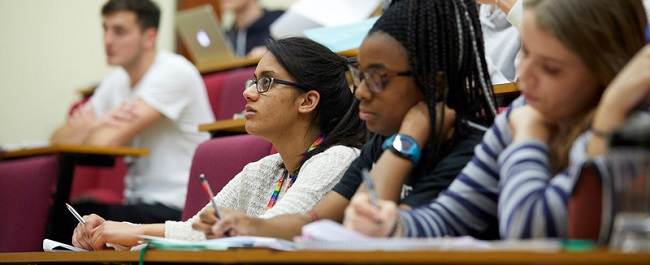Teaching and assessment
Find out about how you will be taught and assessed and the importance of independent learning at Bristol.
At Bristol you will learn through a combination of teaching methods and independent learning.
Teaching methods at Bristol
The teaching styles and formats of classes provided at Bristol may be different to those at your home university. You may find that you have fewer hours of teaching than you expected. You should use the remainder of your time to study independently, working through your course reading list or assignments.
Teaching may include:
- lectures
- small-group seminars
- tutorials
- practical sessions
- electronic learning.
Science-based courses may include laboratory sessions and project groups.
You will be fully integrated into the University and study alongside British students.
Find out about how to get the most out of the different types of teaching methods. This will help you to use your time efficiently during study so that you can easily consolidate and learn material when it comes to revision.
Assessment
Assessment methods
You will be assessed using a variety of methods. This may include:
- exams
- coursework (including essays and reports)
- group projects
- presentations.
We use coursework, tutorials and seminars to monitor your progress and to assess the level of competence in a subject. We may assess some units by one exam at the end of the semester. Regular homework and small pieces of assessed work are not common in the UK.
Find out more about how we will assess you.
Credits
You are awarded credits for successfully completing a unit. You will normally need to pass all forms of assessment in order to gain credits for a unit.
Find out more about the credit point system at Bristol.
Resits
Resits or re-submissions of coursework are not allowed for incoming Study Abroad students at Bristol. Once your work has been assessed you will not be able to have your work re-assessed. Being re-assessed or taking a re-sit at Bristol is for the purpose of progression in a Bristol degree programme which does not apply to incoming Study Abroad students.
Grade conversion
The grading system at Bristol might be very different from the grades you usually see at your home university.
This table is an indication of how the Bristol grading system might be equivalent to the grades at your home university. This table is a guide only.
| Bristol grade | Equivalent letter grade |
|---|---|
| 68 and higher | A- to A+ |
| 58 – 67 | B- to B+ |
| 50 – 57 | C- to C+ |
| 40 – 49 | D- to D+ |
| Below 40 | F |
Learning independently
Independent learning is an important part of academic life at Bristol.
You may find that you have fewer hours of teaching than you expected. When you are not being taught, you should use the remainder of your time to study or work through your course reading list.
It is important to establish a good working routine so that you use time effectively. Learning independently will challenge your motivation and dedication, while developing your organisational and time management skills. You will learn to take responsibility for your workload, commitments and deadlines.
Learning to study independently will enable you to succeed in your studies, and will give you the skills needed for graduate study.
Independent study may be different from what you have experienced at home and it can take a while to adjust, but most students find they quickly adapt and thrive in this environment.
Read some tips for mastering independent learning.
